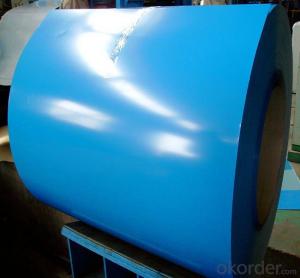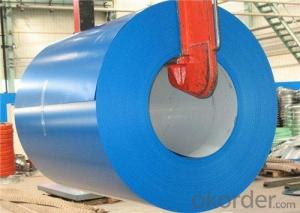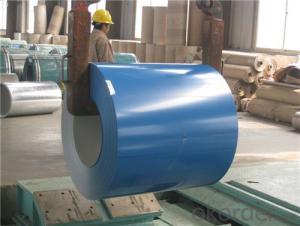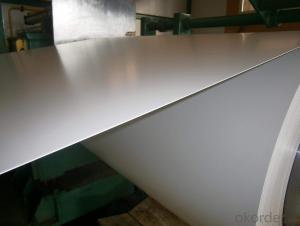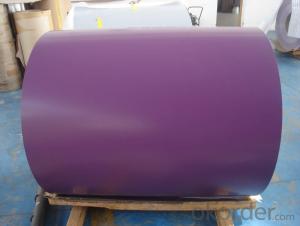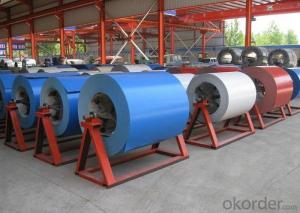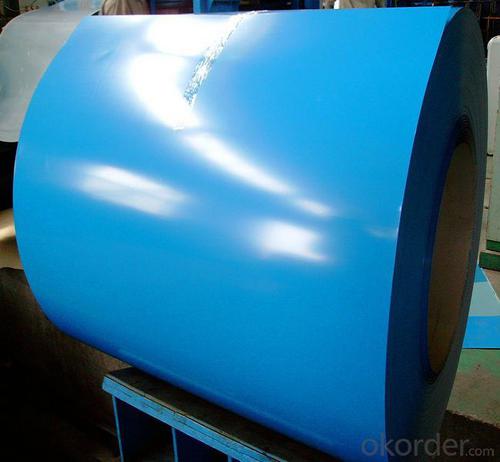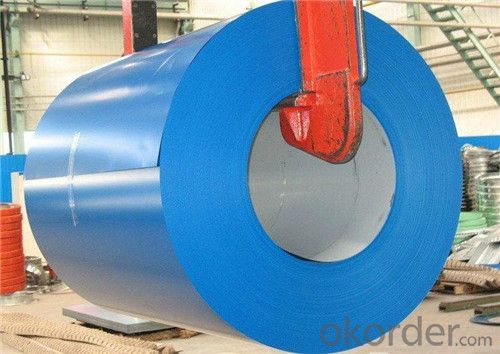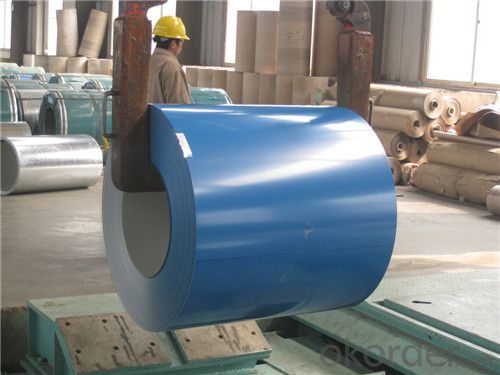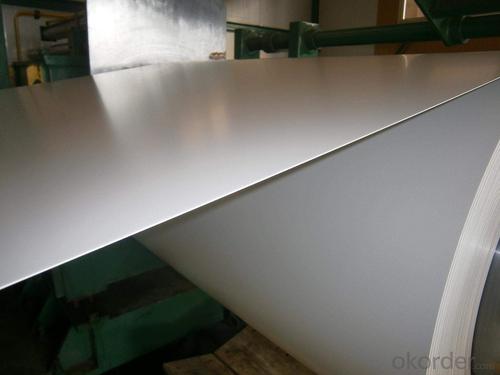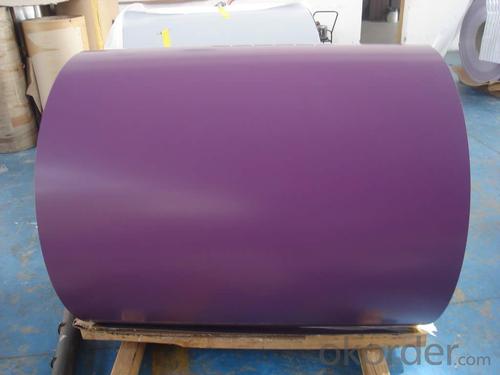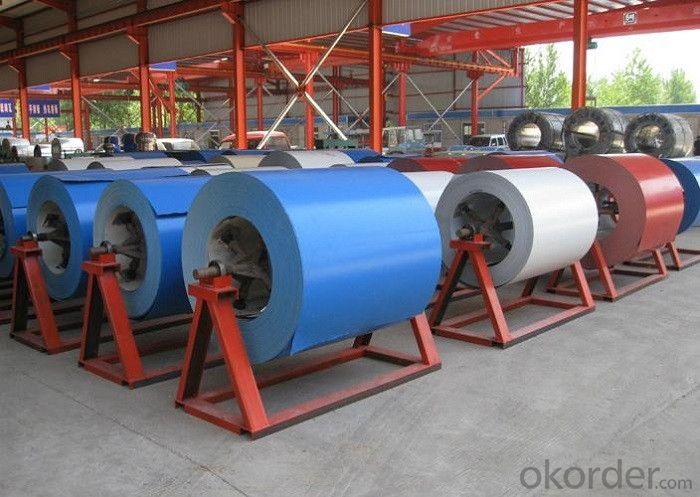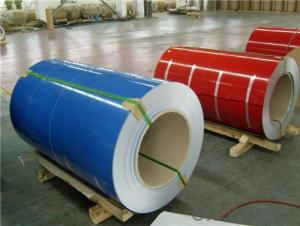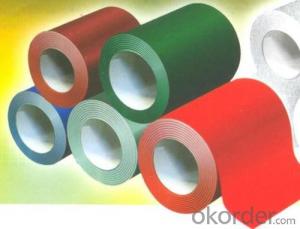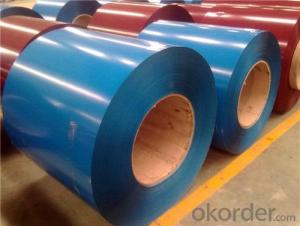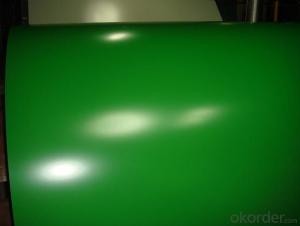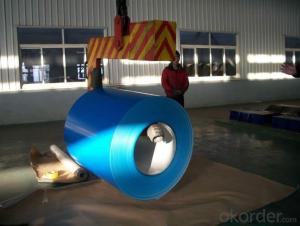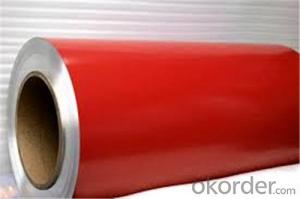Z21 BMP Prepainted Rolled Steel Coil for Construction
- Loading Port:
- Shanghai
- Payment Terms:
- TT OR LC
- Min Order Qty:
- 100 m.t.
- Supply Capability:
- 30000 m.t./month
OKorder Service Pledge
OKorder Financial Service
You Might Also Like
Structure of Z21 BMP Prepainted Rolled Steel Coil for Construction
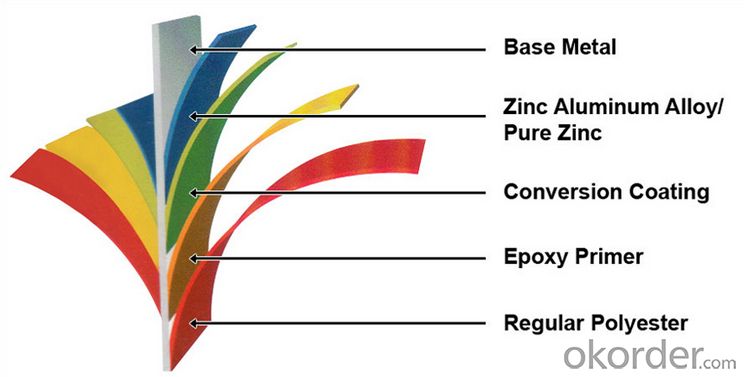
Description of Z21 BMP Prepainted Rolled Steel Coil for Construction
1. Prepainted steel coil is coated with organic layer, which provides higher anti-corrosion property and a longer lifespan than that of galvanized or galvalume steel sheets.
2. The base metals for prepainted steel coil consist of cold rolled, HDGI Steel, electro-galvanized and hot-dip alu-zinc coated steel. The finish coats of prepainted steel coil can be classified into groups as follows: polyester, silicon modified polyesters, polyvinylidene fluoride, high-durability polyester, etc.
3. The production process has evolved from one-coating-and-one-baking to double-coating-and-double-baking, and even three-coating-and-three-baking.
4. The color of the prepainted steel coil has a very wide selection, like orange, cream-colored, dark sky blue, sea blue, bright red, brick red, ivory white, porcelain blue, etc.
5. The prepainted steel coils can also be classified into groups by their surface textures, namely regular prepainted sheets, embossed sheets and printed sheets.
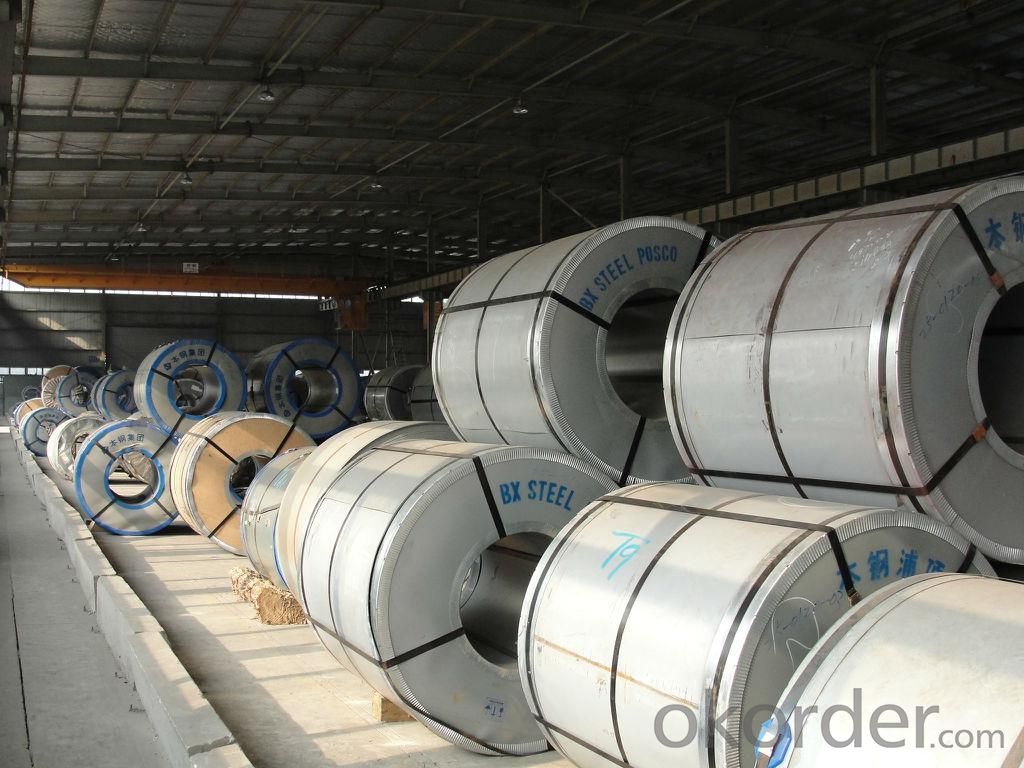
Main Feature of Z21 BMP Prepainted Rolled Steel Coil for Construction
Galvanized steel sheet(include HDG and EG)
With the features of good corrosion resistance, the products are mainly used in automobile, home appliance, electronics, building and machinery manufacture industries, etc.
Precoated steel sheet
With the features of enviromental protection and good processablility, long lasting surface durability, rich in colors, the products are maily used in building, home appliance and furniture industries, etc.
Electrical steel sheet
Mainly used to manufacture generating equipment, locomotive, industrial motor and home appliance.
Applications of Z21 BMP PPGI Prepainted Rolled Steel Coil for Construction
Construction
Manufacture anticorrosion, industrial and civil architecture roof boarding, roof grille
Light industries
Home appliance's case, civil chimney, kitchen utensils
Auto industry
Corrosion resistant parts of cars
Agriculture
Food storage, meat and aquatic products' freezing and processing equipment
Commerce
Equipments to store and transport materials, and packing implements
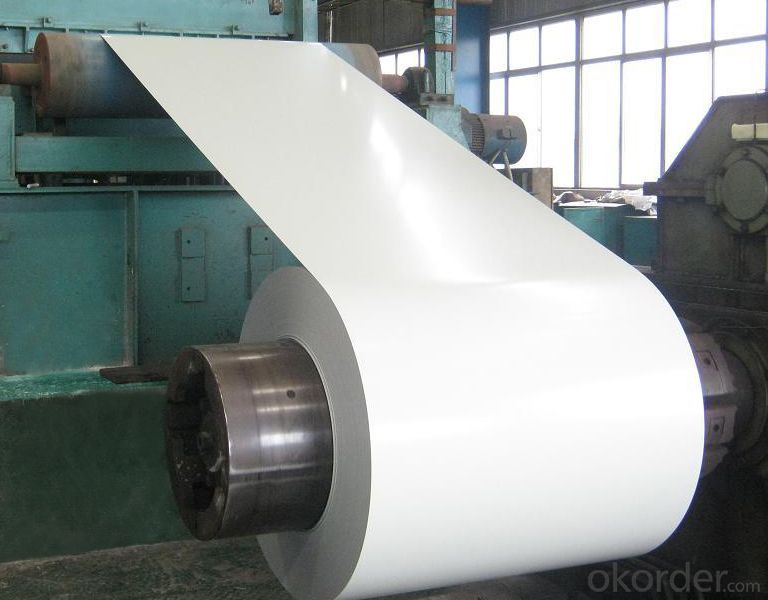
Specifications of Z21 BMP Prepainted Rolled Steel Coil for Construction
Product | Z21BMP Prepainted Rolled Steel Coil for Construction |
Material Grade | SGCC / SGCH / DX51D+AZ, etc |
Thickness | 0.6-3.0mm |
Width | 500-1500mm |
Tolerance | Thickness: +/-0.02mm , Width:+/-2mm |
Zinc-coating | Z30-150g/m2 |
Technique | Raw material: Hot rolled steel coil --> Cold rolled_>hot dipped galvalume |
Surface | Dried, Chromated, Unoiled |
Spangle | Regular spangle , small spangle, zero spangle |
ID | 508MM 610MM |
Coil weight | 1-25MT |
Export package | Cardboard inner sleeves, Waterproof paper, galvanized steel covered and steel strip packed |
FAQ of Z21 BMP Prepainted Rolled Steel Coil for Construction
1.What's your MOQ?
25MT, it is for one container.
2.Do you have QC teams?
Yeah, sure, our QC team is very important, they will keep the quality control for our products.
3.Are the products tested before shipping?
Yes, all of our PPGI and GI was qualified before shipping. We test every batch every day.
4.What's your normal delivery time?
Our delivery time about 15-20days for standard sizes, if you have other requirements like hardness, quanity and width ,it is about 20-40days. But don't worry ,we also try our best for the delivery time ,because time longer and our cost is higher.
- Q: How are steel coils used in the production of steel doors?
- Steel coils are used in the production of steel doors as the primary raw material. These coils are unwound and fed into a roll forming machine, where they are shaped into the desired door profile. The steel coils provide the necessary strength, durability, and rigidity to the doors, ensuring they can withstand various external forces and provide security.
- Q: What is the difference between carbon steel and spring steel?? And which is the better one to make swords with??
- All steel has carbon in it. If too much carbon is in the steel it is extremely hard and brittle. Like cast iron. The only difference between iron and steel is the level of carbon. Cast iron is very hard. A drill can barely drill thru it unless you treat it with something like cobalt or titanium nitride. But if you hit cast iron with a hammer very sharply it will break into pieces from the shock. Too low of carbon causes problems though. Steel is very flexible and machinable when it has very low carbon, but it also doesn't wear very well. If you made a sword out of low carbon steel, it would bend very easily and the edge would get dull quick. If you bent it, it wouldn't spring back either. That gets us to spring steel. This is just the right amount of carbon so the steel is very hard and the sword can hold an edge. It also gives it shock resistance. You can bend the sword and it returns to it's original shape. That is why it is called spring steel. The steel resists bending and when it does bend, as long as it isn't to far, it springs back when let go, to it's original shape
- Q: Can steel coils be transported by air?
- Yes, steel coils can be transported by air.
- Q: How do steel coils withstand extreme temperatures?
- Steel coils are able to withstand extreme temperatures due to their unique composition and manufacturing process. Steel, the primary material used in coils, is an alloy of iron and carbon that possesses excellent thermal properties. Its high melting point, which can reach up to 2,500 degrees Fahrenheit (1,370 degrees Celsius), allows it to remain structurally stable under intense heat. Furthermore, steel coils are often subjected to a process called annealing, which involves heating the steel to a specific temperature and then slowly cooling it down. This annealing process helps relieve internal stresses within the steel, making it more resistant to thermal expansion and contraction. By reducing the presence of internal defects, annealing also enhances the steel's overall strength and durability, allowing it to better withstand extreme temperatures. Moreover, steel coils are often coated with protective layers to provide additional resistance against temperature variations. These coatings, such as galvanized or zinc coatings, act as a barrier between the steel and the external environment. They help prevent oxidation, corrosion, and other forms of degradation that can occur when exposed to extreme heat or cold. In summary, steel coils are able to withstand extreme temperatures due to the inherent properties of steel, the annealing process that relieves internal stresses, and the protective coatings that provide an extra layer of resistance. These factors work together to ensure that steel coils remain structurally stable and maintain their performance even in the harshest temperature conditions.
- Q: What are the different types of steel coil coating materials?
- There are several different types of steel coil coating materials that are used in various industries and applications. Some of the most common types include: 1. Polyester: Polyester coil coating materials are known for their durability and resistance to weathering. They are often used in outdoor applications such as roofing and cladding, where they provide excellent protection against fading, chalking, and corrosion. 2. Polyvinylidene Fluoride (PVDF): PVDF coil coating materials are highly resistant to chemicals, UV radiation, and weathering. They are commonly used in architectural applications, where they provide long-lasting color retention and excellent protection against harsh environmental conditions. 3. Polyurethane: Polyurethane coil coating materials offer a high level of flexibility and adhesion, making them ideal for applications that require resistance to abrasion, impact, and bending. They are commonly used in the automotive and appliance industries. 4. Epoxy: Epoxy coil coating materials are known for their excellent adhesion and corrosion resistance. They are often used in industrial applications such as metal furniture, storage tanks, and machinery, where they provide long-lasting protection against chemicals and abrasion. 5. Silicone Modified Polyester (SMP): SMP coil coating materials combine the durability of polyester with the flexibility of silicone. They are commonly used in agricultural and industrial applications, where they provide excellent resistance to chipping, cracking, and peeling. These are just a few examples of the different types of steel coil coating materials available in the market. The choice of coating material depends on the specific requirements of the application, such as durability, weather resistance, chemical resistance, and aesthetics.
- Q: How are steel coils used in the manufacturing of automotive springs?
- Steel coils are used in the manufacturing of automotive springs as they provide the necessary strength and flexibility required to support the weight of the vehicle and absorb shocks and vibrations. The steel coils are shaped and tempered to specific dimensions and then coiled to form the springs, which are then installed in various parts of the vehicle's suspension system to ensure smooth and stable ride quality.
- Q: What are the different types of steel coil transport methods?
- There are several different types of steel coil transport methods, including trucking, rail transportation, and sea freight. Trucking involves using flatbed trucks or specialized trailers to transport steel coils over short distances. Rail transportation utilizes flatcars or specialized railcars to transport steel coils over long distances. Sea freight involves shipping steel coils in containers or on specialized vessels across international waters.
- Q: What are the different types of steel coil surface finishes?
- There exist various options for steel coil surface finishes, each possessing distinct characteristics and uses. Some of the most frequently seen types are as follows: 1. Hot rolled: Achieved by subjecting the steel to high temperatures, resulting in a rough and textured surface. Hot rolled steel coils are commonly employed in applications where aesthetics are not a priority, such as structural or industrial projects. 2. Cold rolled: In contrast to hot rolled steel, cold rolled steel coils are processed at lower temperatures, resulting in a smoother and more refined surface. This finish is suitable for applications where a clean and polished appearance is desired, such as automotive parts, appliances, and furniture. 3. Galvanized: These steel coils are coated with a layer of zinc to safeguard against corrosion. This finish provides excellent rust resistance and can be utilized in various outdoor applications, including roofing, fencing, and signage. 4. Stainless steel: Stainless steel coils possess a unique finish that is resistant to corrosion, staining, and rust. Due to this, they find great versatility and suitability across a wide range of applications, including kitchen appliances, medical equipment, and architectural projects. 5. Coated: Coated steel coils are treated with a protective layer of paint or other coatings to enhance durability and aesthetic appeal. This finish is commonly employed in the construction industry for applications such as roofing, siding, and garage doors. 6. Pre-painted: Before being formed into the final product, pre-painted steel coils are coated with a layer of paint or resin. This finish offers a wide range of colors and finishes, making it popular for applications such as building cladding, appliances, and automotive parts. In summary, the selection of a steel coil surface finish relies on the specific requirements of the project, including aesthetics, corrosion resistance, and durability. Each finish has its own advantages and disadvantages, and it is crucial to consider these factors when choosing the appropriate type of steel coil surface finish for a particular application.
- Q: What are the factors affecting the formability of steel coils?
- There are several factors that can affect the formability of steel coils, including the composition and microstructure of the steel, the thickness and width of the coils, the temperature at which the forming process takes place, the lubrication used during forming, and the equipment and techniques employed.
- Q: How are steel coils used in the production of structural steel?
- Steel coils are widely used in the production of structural steel due to their versatility and efficiency. These coils, which are made by rolling steel into a cylindrical shape, serve as the raw material for various structural steel products. One of the primary uses of steel coils in the production of structural steel is in the manufacturing of beams and columns. These coils are processed in steel mills, where they undergo cutting, shaping, and bending to form the desired profiles. Beams and columns are essential components of any building or infrastructure project as they provide support and stability. Steel coils are also used in the fabrication of steel plates, which are widely used in the construction industry. These plates are used for flooring, cladding, and roofing purposes, adding strength and durability to structures. By using steel coils as the starting material, manufacturers can produce steel plates of various thicknesses and sizes according to project requirements. Furthermore, steel coils are an integral part of the production process for pipes and tubes. These coils are formed into a cylindrical shape and then welded or seamless to create pipes and tubes of different diameters. Steel pipes and tubes are vital for various applications, including water and gas transportation, structural frameworks, and industrial systems. In addition to these applications, steel coils are also used in the production of other structural steel products such as angles, channels, and hollow sections. These products are widely used in construction projects, providing structural support, reinforcement, and aesthetic appeal. Overall, steel coils play a crucial role in the production of structural steel by serving as the raw material for various products. Their versatility, ease of processing, and strength make them an ideal choice for manufacturers, ensuring the production of high-quality and reliable structural steel components.
Send your message to us
Z21 BMP Prepainted Rolled Steel Coil for Construction
- Loading Port:
- Shanghai
- Payment Terms:
- TT OR LC
- Min Order Qty:
- 100 m.t.
- Supply Capability:
- 30000 m.t./month
OKorder Service Pledge
OKorder Financial Service
Similar products
Hot products
Hot Searches
Related keywords
